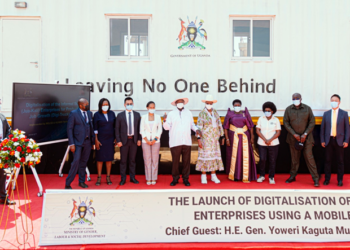Africa has long had the reputation of being slightly behind the times when it comes to technological and digital advancements. However, with countries like Kenya, Nigeria, and Uganda boasting vibrant ICT sectors, this mindset needs to be updated. Experts predict that Africa is set to be the next global tech hub as start-up incubators and accelerators continue to expand across the continent. Uganda and Ghana are establishing international tech ecosystems, while governments and private entities work to grow the African tech landscape and establish a foothold on the global tech stage.
So, why does Africa’s conservative tech reputation linger? Perhaps it’s because there are age-old ideas about the continent’s tech adoption that no longer hold true, like these five myths about Africa and the cloud.
Myth #1: African companies aren’t prioritising or investing in cloud computing
While it’s true that many companies in Africa are focusing on improving customer service, expanding their customer base, and cutting back on costs, there’s also a massive adoption of cloud services taking place. According to the Cloud in Africa 2023 study by World Wide Worx, 69% of respondents expect to see an increase in cloud spend this year – up from 61% in 2022. This suggests that cloud computing is becoming part of the intrinsic DNA of business. And, if deployed properly, cloud services can assist with the above-mentioned business goals to facilitate companywide growth and efficiency.
Myth #2: Moving to cloud infrastructure is expensive
This may have been the case years ago when the choice of cloud service providers was more limited, and networking, storage, and computing solutions were less advanced. However, today, there are over 360 vendors worldwide and 550 cloud platform services across 22 categories. This means businesses can assess their options and choose the cloud solutions that best suit their budget and digital requirements. And, according to a 2020 Cloud in Africa report, as many as 84% of respondents believe cloud computing is cost-effective.
Cost savings associated with moving to the cloud include reduced upfront capital costs for hardware – as you don’t have to purchase physical servers, network storage, or cooling systems – reduced software costs, as most upgrades are included in monthly fees, lower IT support costs, and long-term savings due to greater operational efficiency.
Myth #3: There aren’t enough cloud platforms available in Africa
It’s been alleged that this is one of the reasons corporations in Africa have been slow to adopt cloud solutions. And, while there are admittedly fewer providers in countries like Uganda, compared to the above-mentioned global figures, there are certainly enough options to satisfy even the most discerning business owner. The same Cloud in Africa 2023 study revealed that 60% of organisations use at least one cloud service, with 26.5% adopting a multi-cloud strategy with two to five providers. In 2020, there was a near duopoly between Google (54%) and Microsoft Azure (40%) when it came to choosing a key cloud provider. However, other options include Oracle Cloud, AWS, VMware, and IBM. It stands to reason that, with more providers offering quality services, the myth surrounding cloud availability in Africa no longer applies. As more providers come to the fore, companies will have even more options in the future.
Myth #4: African businesses have been slow to adopt cloud technology
This is one of the easiest misconceptions to disprove – especially in light of recent data and the ongoing digital development of African nations. The Cloud in Africa 2023 study found that 75% of organisations are using the cloud for backup, followed by 70% for customer service and support applications. Additionally, African businesses are using cloud-based apps for everything from training and human resources to logistics, marketing, and accounting.
This demonstrates the enthusiasm with which African enterprises are turning to cloud technology. In fact, according to World Wide Worx CEO Arthur Goldstuck, by 2026, the cloud landscape across major African markets will look very similar to the global landscape.
Myth #5: Storing data in the cloud isn’t safe
Several reports cite security concerns as a deterrent against adopting cloud infrastructure, especially in Africa where some institutions are still wary of digital transformation. Because the cloud doesn’t have perimeters, it makes securing it fundamentally different to securing an on-premise environment. Channel Lead at Commvault Africa Gerhard Fourie says, “a popular myth is that an on-premise environment is more secure than the cloud, but the truth is that cloud security is not more or less effective than on-premise.” He believes cloud data security is a shared responsibility between the platform and the enterprise itself.
Companies at the forefront of transformation are discovering the benefits of cloud security. The same Cloud in Africa 2023 report found that 56% of respondents cited improved security as the biggest benefit of the cloud. Security is seen as a barrier by those who have not yet adopted the cloud, but those who have know the value of properly implemented cloud deployments.
As we navigate the second quarter of 2023, businesses both big and small should investigate the possibilities of reliable and scalable cloud solutions. By leveraging the power of cloud computing and cloud-based services, organisations can look forward to a more profitable digital future. With African countries fighting for space on the digital landscape and working hard to advance digital transformation, it’s important to question and challenge age-old cloud-related myths.
Patrick Ndegwa, SEACOM Business Sales Lead for SEACOM East Africa
Do you have a story in your community or an opinion to share with us: Email us at editorial@watchdoguganda.com













